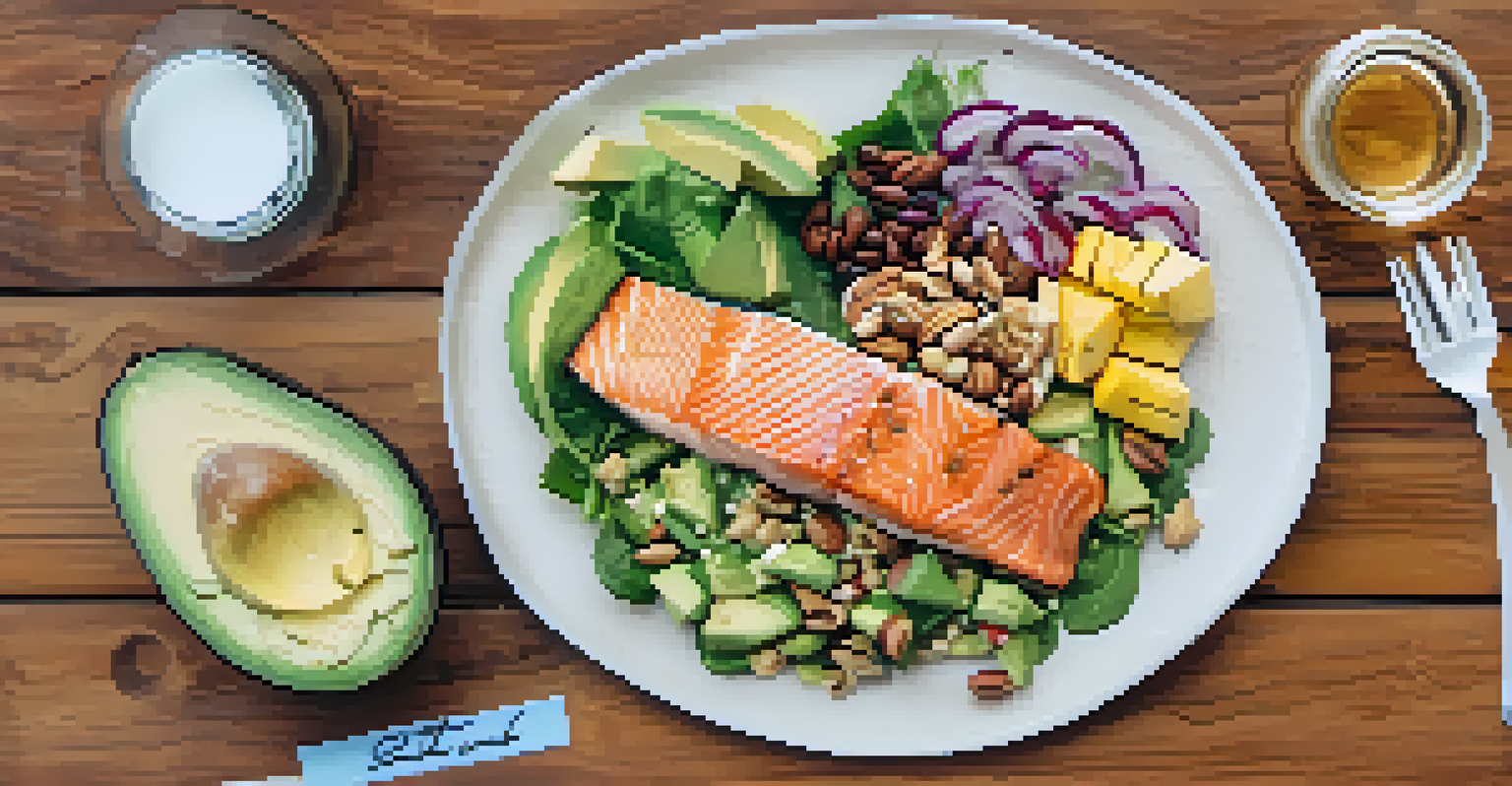Nutrition Tips for Powerlifters: Pregnant Women Edition

Understanding Nutritional Needs During Pregnancy
Pregnancy is a unique time that brings about significant changes in your body, especially for powerlifters. Your nutritional needs will shift to support both your training and the healthy development of your baby. This means focusing on balanced meals that provide adequate calories, protein, vitamins, and minerals essential for you and your growing child.
Pregnancy is a time of great change, and the right nutrition can make all the difference for both mother and baby.
It's important to recognize that your body requires more energy during this period. Incorporating nutrient-dense foods such as lean proteins, whole grains, fruits, and vegetables can help meet these increased demands. You might also consider working with a healthcare professional to ensure you’re on the right track with your nutrition.
Remember, staying well-nourished supports not just your strength training but also your well-being and that of your baby. This holistic approach will set the stage for a healthy pregnancy while continuing your powerlifting journey.
Prioritize Protein Intake for Muscle Maintenance
As a powerlifter, protein is likely a staple in your diet, and this remains crucial during pregnancy. Protein is essential for muscle maintenance and repair, which is especially important when you're lifting weights. Aim for high-quality protein sources such as chicken, fish, eggs, legumes, and dairy products to support your body’s needs.

During pregnancy, your body requires more protein to assist in the development of your baby's tissues and organs. The general recommendation is to increase your intake to about 75-100 grams of protein per day, depending on your activity level and body weight. This can be achieved by spreading protein sources throughout your meals and snacks.
Nutrition Shift for Powerlifters
Pregnancy necessitates a change in nutritional focus to support both your training and your baby's development.
Incorporating protein-rich foods not only aids in maintaining your strength but also helps in minimizing muscle loss as your body adapts to the changes of pregnancy. This focus on protein ensures you're fueling both your workouts and your baby's growth.
Incorporate Healthy Fats for Energy and Nutrients
Healthy fats play a vital role in your nutrition, especially during pregnancy. They provide a concentrated source of energy necessary for your intense powerlifting sessions and overall health. Sources of healthy fats include avocados, nuts, seeds, and olive oil, which can easily be added to your meals and snacks.
You are what you eat, and during pregnancy, it’s crucial to eat for two.
During pregnancy, fats are not just about energy; they also support your baby's brain development and hormone production. Omega-3 fatty acids, found in fatty fish like salmon or in flaxseeds, are particularly beneficial for fetal growth. Don't shy away from these healthy fats; they are essential for both you and your baby's health.
Balancing your intake of healthy fats can help maintain your energy levels and performance in the gym. It's all about finding that sweet spot where you feel strong and nourished while supporting your growing family.
Stay Hydrated to Support Performance and Health
Hydration is crucial for everyone, but it becomes even more important during pregnancy. Water helps in digestion, nutrient absorption, and temperature regulation, all of which are vital when you're powerlifting. Aim to drink plenty of fluids throughout the day, especially before, during, and after your workouts.
Dehydration can lead to fatigue and decreased performance, which you want to avoid as a powerlifter. Consider hydration options like electrolyte drinks, especially after intense workouts, to replenish lost minerals. Additionally, incorporating water-rich foods like fruits and vegetables can contribute to your overall fluid intake.
Protein is Key During Pregnancy
Increasing protein intake is essential for maintaining muscle and supporting your baby's growth.
Pay attention to your body's signals for thirst, and don't hesitate to increase your fluid intake when needed. Staying hydrated supports not just your training but also the overall health of you and your baby during this vital time.
Timing Your Meals for Optimal Energy Levels
Meal timing can significantly impact your energy levels and performance during workouts, especially in pregnancy. Eating smaller, frequent meals can help maintain stable blood sugar levels and prevent energy crashes. Aim for a balanced mix of carbohydrates, proteins, and fats in each meal to fuel your workouts effectively.
Consider having a light snack before training to provide an energy boost; think of options like a banana with almond butter or yogurt with berries. Post-workout, focus on recovery by consuming a meal rich in protein and carbohydrates to help your muscles repair and replenish glycogen stores.
Being mindful of when you eat can enhance your workout experience and help you manage any pregnancy-related fatigue. This approach ensures that you're not only feeling your best but also supporting your powerlifting goals.
Incorporate a Variety of Nutrient-Dense Foods
Diversity in your diet is key to getting a wide range of nutrients needed during pregnancy. Incorporating a variety of foods ensures that you receive all the essential vitamins and minerals that support both your strength training and your baby's development. Think of your plate as a colorful canvas filled with fruits, vegetables, whole grains, and protein sources.
Each food group offers unique benefits; for instance, leafy greens are rich in folate, while citrus fruits provide vitamin C. Experimenting with different recipes and cuisines can make eating healthy more enjoyable and less monotonous. Consider meal prepping to include diverse ingredients in your weekly meals.
Stay Hydrated for Optimal Health
Proper hydration is crucial for performance and overall well-being during pregnancy, especially for active individuals.
By embracing a varied diet, you not only nourish your body for powerlifting but also pave the way for a healthy pregnancy. This approach fosters a positive relationship with food and encourages mindful eating habits.
Consult with a Professional for Tailored Guidance
Navigating nutrition during pregnancy can be overwhelming, especially for active individuals like powerlifters. Consulting with a registered dietitian or nutritionist can provide tailored advice that aligns with your specific needs and goals. They can help you create a personalized meal plan that considers your training regimen and pregnancy requirements.
A professional can also assist you in identifying any nutrient deficiencies and suggest appropriate supplements if necessary. This collaboration ensures you're making informed choices that support your health and performance without compromising your baby's growth.

Investing time in professional guidance helps you feel confident in your dietary choices, allowing you to focus on both your powerlifting and the joy of becoming a parent. Remember, you're not alone in this journey, and expert advice can make all the difference.